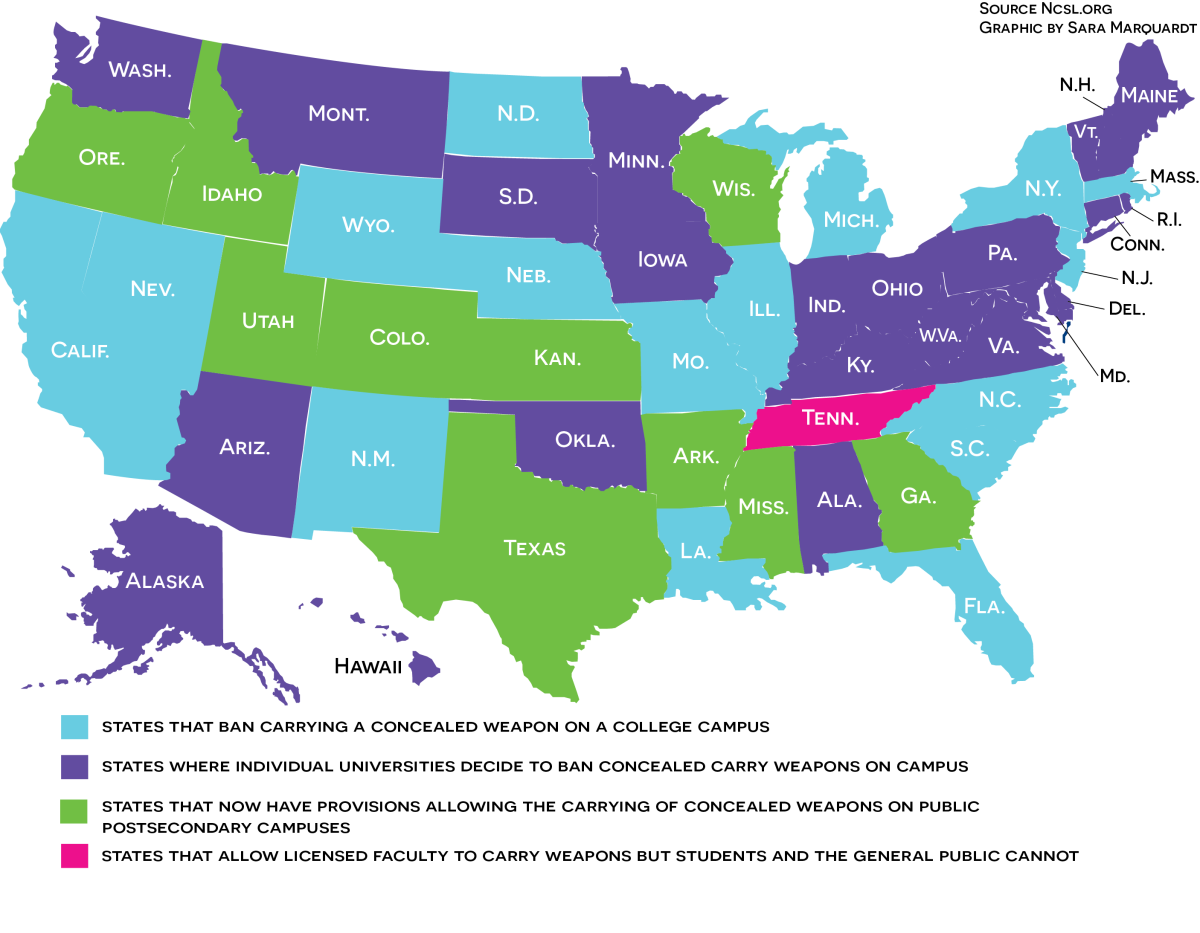
The Missouri House of Representatives will discuss House Bill 1936 Monday, which would expand concealed gun carry laws to include public college campuses.
In addition to removing private property like churches, businesses and the state Capitol from the gun-free zone statute, the bill proposal would once again attempt to permit concealed carry for public higher education campuses. Like businesses, private colleges would be able to choose their own gun policies; public colleges would not.
HB 1936 is sponsored by Rep. Jered Taylor (R-Nixa), who sponsored a similar version of the bill last year that made it through committee but failed on the floor.
“We see time and time again that these shooters, these criminals, go into locations where they know they’re not going to be stopped within a reasonable amount of time, and they’re able to carry out their attack,” Taylor said. “The way to stop them is with force.”
He also cited high rates of sexual assault among college-age people as a reason to allow campus carry.
“Why aren’t we giving these individuals the ability to protect themselves?” Taylor said. “We are making them victims by not allowing them to protect themselves on college campuses.”
In light of the shooting at Marjory Stoneman Douglas High School last week that killed 17, Taylor believes this bill would allow victims of an attack to potentially stop the shooter.
“Let’s just say one of those coaches that was killed protecting those students…was able to carry a firearm,” Taylor said. “We could be talking about a different situation. He could have stopped the attack at that moment.”
He added that mental health also needs to be considered in gun legislation to make it harder for those with mental illnesses to purchase firearms.
Christopher Dade, president of the Associated Students of the University of Missouri at MU, said he believes firearms do not belong on college campuses. He worries it could threaten the ability for students to feel safe expressing ideas or thoughts that could be potentially offensive. As an MU tour guide, he has seen firsthand the comfort of prospective students knowing MU is a gun-free school.
Growing up in a small town in Missouri, Dade recognizes that MU is comprised of students who grew up in towns like his who are comfortable around guns and feel safer with them — as well as students who feel safe explicitly because guns aren’t allowed. This kind of debate is hard because both sides are valid, Dade said.
He and ASUM, whose members will be present at Monday’s hearing to testify against the bill, believe keeping public Missouri colleges gun-free is still the best option for everyone.
“On balance, there’s a greater need to protect public health, public safety and the sort of academic freedom of a university,” Dade said.
Dade said the active shooter alert on campus this past October reaffirmed his belief that MUPD should be solely responsible for handling guns and responding to attacks.
“Seeing how students in my classes reacted to parts that they heard or partial truths that they knew…I know that if they had had a weapon, they would have tried to be the hero, take matters into their own hands,” Dade said. “I am convinced that someone who was innocent would have gotten hurt. MUPD [had] the situation under control.”
He said adding more armed people into the mix, whether they are concealed carry permit holders or trained university staff, would also make it harder for MUPD.
“It just makes the people that we pay to keep campus safe…it makes their job harder and it makes them less effective when we have people that aren’t with MUPD — that aren’t professionals — that may or may not also have guns,” Dade said.
Brian Weimer, University of Missouri Police Department major, said MUPD will continue to enforce laws the legislators set forth. Generally, anywhere where concealed carry is allowed, he said police would face the problem where they would have to take caution identifying the target.
“I think the concern is, just as it would be not just on campuses but anywhere if other people [were] carrying firearms, is just making sure that a person who may be there trying to intervene to do things right is not shot by someone else because they don’t know who’s the bad guy [or] who’s the good guy,” Weimer said.
MUPD did not comment on the pending legislation.
_Edited by Skyler Rossi | [email protected]_